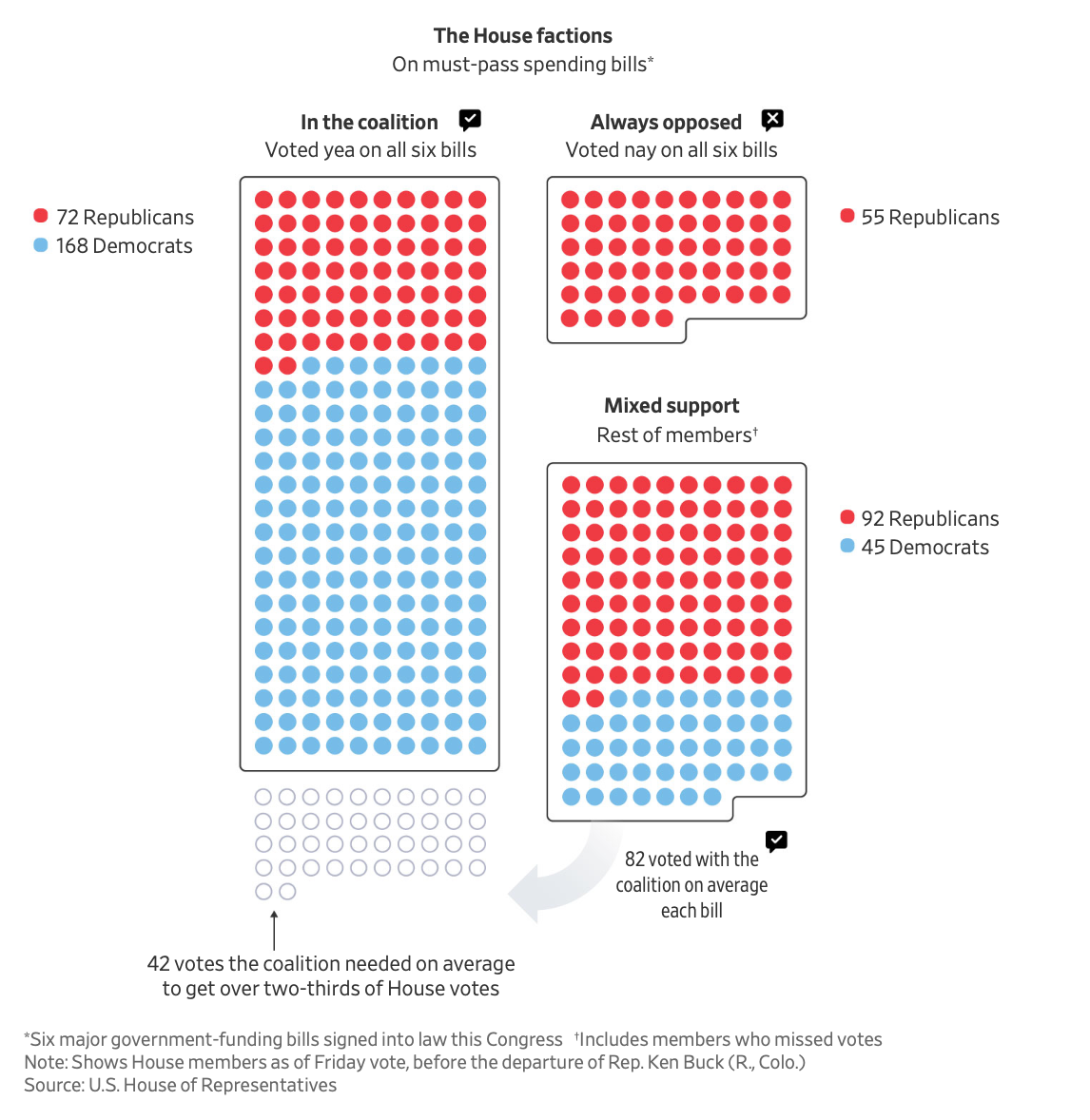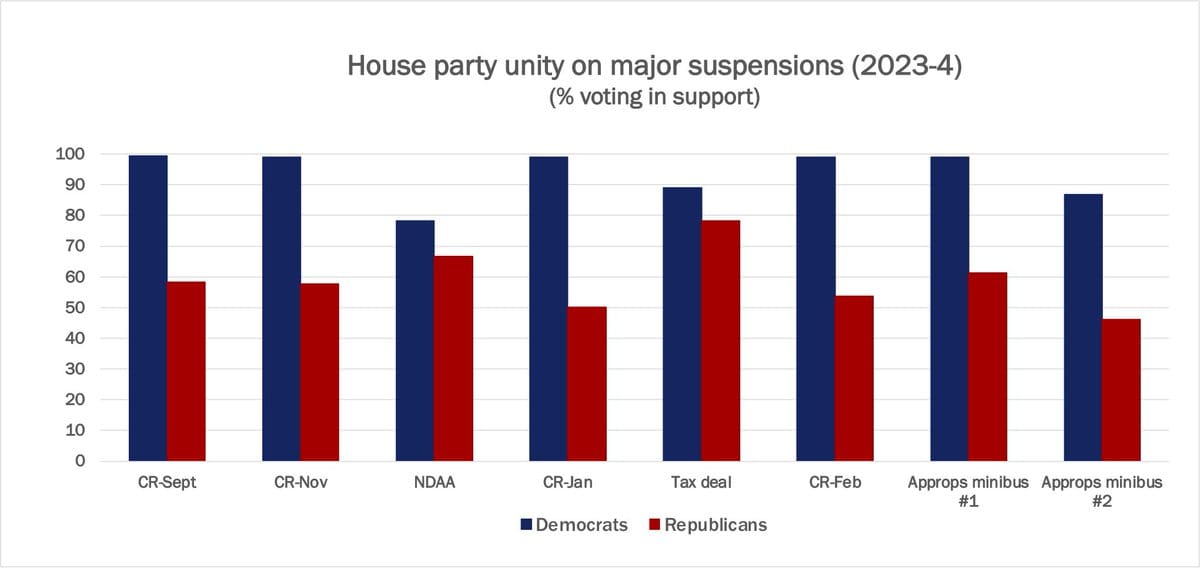Does Mike Johnson want a deal?

Good morning! It’s Monday, March 25, 2024. Election Day is 225 days away. If this newsletter was forwarded to you, subscribe here. If you want to contribute to support my work, donate here.
Mike Johnson’s speakership is being threatened after he worked with Democrats to pass a government funding deal opposed by much of his own party.
In other words: he’s in a very familiar place for a leader of the House GOP. In fact, Johnson is the third straight Republican speaker of the House to find himself in this exact position.
Neither of his two immediate predecessors — John Boehner and Kevin McCarthy — survived this same predicament. Boehner resigned in 2015 after Mark Meadows filed a motion to vacate the chair, opting to step down rather than face a vote on his ouster. When McCarthy faced a similar motion last year, he chose to let it to play out; he was eventually axed by eight Republicans and all 208 voting Democrats.
In both cases, the main crime Boehner and McCarthy were being punished for was working across the aisle to keep the government running — bipartisan cooperation that theoretically could have extended, had they wanted it to, to rescuing their gavels. Several Democrats said they were willing to throw Boehner a lifeline; many expressed openness to a compromise with McCarthy as well. Ultimately, though, turning to Democrats to prop up a Republican speakership was a bridge too far, even for two men already being excommunicated for seeking help from Democrats. Neither tried to stay in office through some sort of cross-party coalition; their departures, then, were ultimately somewhat voluntary. “Kevin McCarthy did this to himself,” I wrote last year, chronicling the bipartisan deal that could have been available to him, had he only tried to execute it.
Now, the same deal that McCarthy spurned is available to Johnson. Like under McCarthy, a Republican rebel (this time, Marjorie Taylor Greene instead of Matt Gaetz) has filed a motion to axe Johnson after he passed a bipartisan funding bill (this time, a package that didn’t even receive support from a majority of Republicans).
Greene, like Meadows but unlike Gaetz, filed the motion unprivileged — which means it won’t receive a vote automatically. But Greene can re-introduce the motion at any time and make it privileged, which would trigger a vote on ousting Johnson within two legislative days. “It’s more of a warning than a pink slip,” the the Georgia firebrand said of the motion now hanging over Johnson like the sword of Damocles.
Because the GOP majority is so slim (and getting slimmer), if Greene cuts the sword loose, she would only need the votes of two other Republicans to defenestrate the speaker ... unless he receives support from Democrats. Ironically, the very thing that Greene has warned would make her pull the trigger is the exact price that Democrats have named in exchange for coming to Johnson’s rescue: a floor vote on Ukraine aid.
Johnson will now have to decide: a Ukraine deal with Democrats, or the second-shortest speakership in history. (At least he will have beaten Theodore Pomeroy’s one day with the gavel.)
On its face, a deal of this sort would seem to be genuinely extraordinary (though not completely unprecedented: as I’ve noted before, the House was run by a cross-party coalition in the 1850s). In the modern era, though, the House has always been run by one partisan camp or the other; speakers may have relied on votes from the other party on key bills, but never to maintain their very power.
The result would be a fragile governing coalition, susceptible to collapse at any time: even if Democrats rescued Johnson, they could always turn around and change their minds if he did something to upset them, sparking a new motion to vacate with their support. There would be constant potential for chaos.
But here is where I want to inject two caveats, to show that this prospect might not be as crazy as it sounds.
First, it should be noted that the government has already remained open all year through exactly this arrangement. As the Wall Street Journal noted this weekend, the six government funding measures approved this fiscal year were ushered to passage by a bipartisan coalition that was largely fueled by the minority party, Democrats.

On nearly every major issue the House has voted on in recent months, political scientist Sarah Binder shows below, at least 80% (and often close to 100%) of Democrats voted for passage, while closer to 60% of Republicans did so. None of these bills would have succeeded without reliable Democratic support.

Yes, it would be an escalation for this coalition to go from approving pieces of legislation to setting the terms of House control. But let’s be clear: the conditions I described earlier — where government function relies on Democrats working hand and hand with Johnson on every major vote, the threat of a chaotic outcome looming if their cooperation fractures — have already been operative for months now.
Second, I think not enough attention has been paid to the fact that Johnson already seems to be leaning towards holding a Ukraine vote anyways.
In fact, he basically said as much in his statement after the government funding vote on Friday:
“We will also take the necessary steps to address the supplemental funding request. We have done important work discussing options with members — such as the REPO Act, loans, additional sanctions, and energy exports, among other measures — and are preparing to complete our plan for action.”
Johnson is still considering how to structure a Ukraine aid measure (as a loan, perhaps, or by using seized Russian assets), but he has already all but committed to holding a vote on it — which is exactly what MTG has said would trigger a motion to vacate, and what Democrats have said would take for them to back him.
Rep. Mike McCaul (R-TX), the chairman of the House Homeland Security Committee, said on Sunday that Johnson made a “commitment” to putting a Ukraine bill on the floor after the House returns from Easter recess; Rep. Annie Kuster (D-NH) told Axios that the speaker personally “assured” her that a vote would be held “immediately” after Easter break was over.
Even more revealing, Johnson’s rhetoric on Ukraine has slowly began to creep closer to where it was at the beginning of the war. When Russia first invaded Ukraine in February 2022, Johnson called it “the greatest destabilization of the world order since WWII” and a “national security threat to the entire West.” The next month, he tweeted: “America stands with Ukraine.”
Then, like many Republican lawmakers, he changed his tune as his party base (led by Donald Trump) lost interest in Ukraine solidarity. By May 2022, he said this to explain his vote against a Ukraine aid package:
“We should not be sending another $40 billion abroad when our own border is in chaos, American mothers are struggling to find baby formula, gas prices are at record highs, and American families are struggling to make ends meet, without sufficient oversight over where the money will go.”
But, in recent weeks, Johnson has been sounding more like his old self again. Here he is in a joint statement with the NATO secretary-general in January:
“We addressed the importance of sending a clear, decisive message to President Putin that he will not win his war of aggression in Ukraine... NATO is good for Europe and good for the United States.”
And here he is speaking to reporters on March 13:
“There is a right and wrong. There’s good versus evil, in my view, and Ukraine is the victim here… I understand the timetable and I understand the necessity of the urgency of the funding.”
And here, again, in comments to reporters a week later:
“We understand the role that America plays in the world. We understand the importance of sending a strong signal to the world that we stand by our allies. And we cannot allow terrorists and tyrants to march through the globe.”
Johnson is known to be a fickle leader, often changing his mind and telling members what they want to hear. So, nothing can be certain until it happens. But he’s certainly positioning himself exactly as one would if they were preparing to strike a deal with Democrats: first by working with them on government funding (earning their trust after entering the speakership an unknown quantity), and then by signaling that he’s moving to give them the exact concession they’ve demanded.
Because of his rhetorical changes the last few weeks, a specific “deal” with Hakeem Jeffries — which would further inflame conservative anger — might not even be necessary. If he holds a vote on Ukraine aid, and MTG triggers a motion to vacate, he can just say he’d been planning to hold a vote all along (as his comments in recent weeks suggest), and Democrats (who will have won the price they named) could merely vote to keep him in office without any added ceremony.
Nothing will change; everyone comes out a winner. Johnson gets to keep his gavel, in exchange for holding a vote he was already planning to hold anyways. Democrats get their biggest foreign policy priority in the midst of an election year. And MTG will get attention, which she craves over and above any specific policy change. Win-win-win.
More news to know.
UN Security Council passes Gaza ceasefire resolution, U.S. doesn't veto (Axios)
- “Failure of values”: Gantz threatens to bolt coalition over Netanyahu’s Haredi draft bill (Times of Israel)
Without a bond posted, Trump risks losing prized assets following fraud judgment (ABC)
NJ first lady Tammy Murphy ends Senate campaign, paving way for Andy Kim (Politico)
Ronna McDaniel faces sharp criticism after NBC hiring — including on NBC (WaPo)
Biden was planning executive action on the border. Now he’s gone silent. (Politico)
Thanks for reading.
I get up each morning to write Wake Up To Politics because I’m committed to offering an independent and reliable news source that helps you navigate our political system and understand what’s going on in government.
The newsletter is completely free and ad-free — but if you appreciate the work that goes into it, here’s how you can help:
- Donate to support my work or set up a recurring donation (akin to a regular subscription to another news outlet).
- Buy some WUTP merchandise to show off your support (and score a cool mug or hoodie in the process!)
- Tell your family, friends, and colleagues to sign up at wakeuptopolitics.com. Every forward helps!
If you have any questions or feedback, feel free to email me: my inbox is always open.
Thanks so much for waking up to politics! Have a great day.
— Gabe
